ASEAN Forum 2024: ASEAN Business Forum with Malaysian 9th Prime Minister YB Dato' Sri Ismail Bin Sabri Yaakob
Bernas, Kuala Lumpur, Malaysia
27 Jun 2024
Global Catalyst Advisory CEO, Victor Tay, is privileged to give the keynote speech after Malaysian 9th Prime Minister on ASEAN and the Future of Jobs.
He gives an analysis of the difference between AI Disruption and Jobs Displacement, while citing past historical disruption of the steam train by automotive when more jobs were created. Concurrently, he gave a discerning difference between Work, Job, Task and Skills.
1. AI Disruption and Jobs Displacement
He spoke on #AI disruption and #jobs displacement issues in ASEAN. Throughout history all disruption tends to bring better producivity and nett job creation (new jobs - displaced jobs). In 1820s with the advent of individual automotive , there was a #disruption to steam train as defacto transportation mode.
2. Nett Job Creation from Historical Disruption
There was huge job losses at train conductor, technicians, but the automotive industry brought in new jobs across automotive engineers, production managers, assemblers etc which provided nett job creation.
3. Work vs Job vs Task vs Skill
#Work is the outcome created for example in achieving $10m sales. #Job is the work human (business development director) do to achieve the outcome. #Tasks are specific activities (marketing campaign, advertisement) done to achieve the sales outcome. #Skill is the competence to enable us to achieve the outcome (html, design). Task can be automated, Job may be displaced but Work will still need to be done by human. To future-proof ASEAN workforce, there is a need to continually upgrading #workers' Skills to remain pertinent.
4. Skills Centric Vs Academic Qualification hiring
In arresting the disruption challenges, there is also need to shift towards #skills-centric instead of qualification-based hiring.
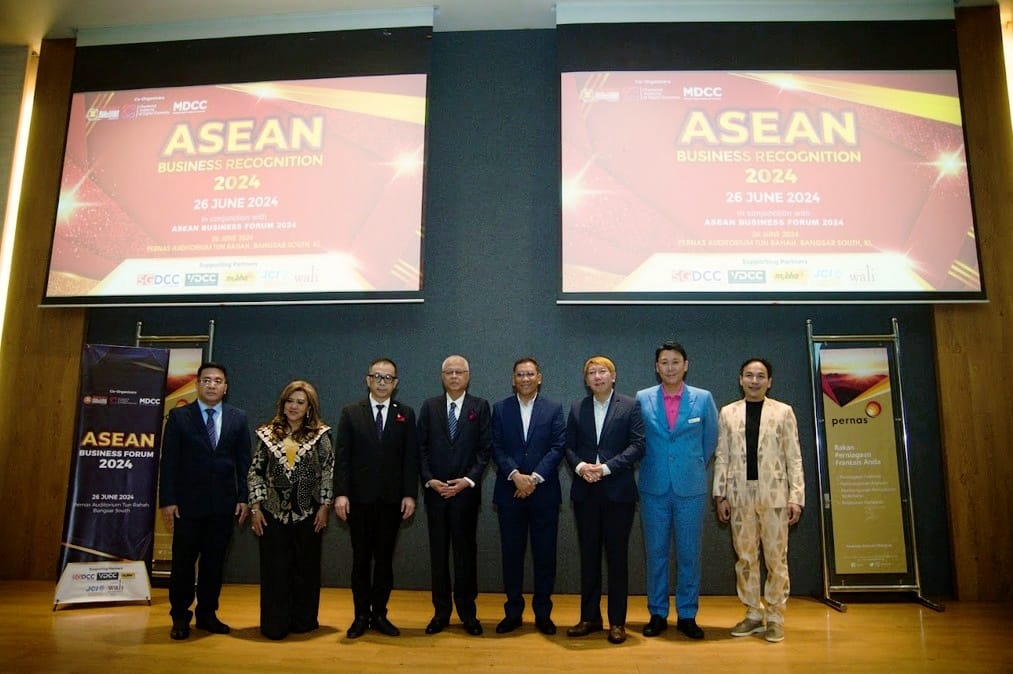
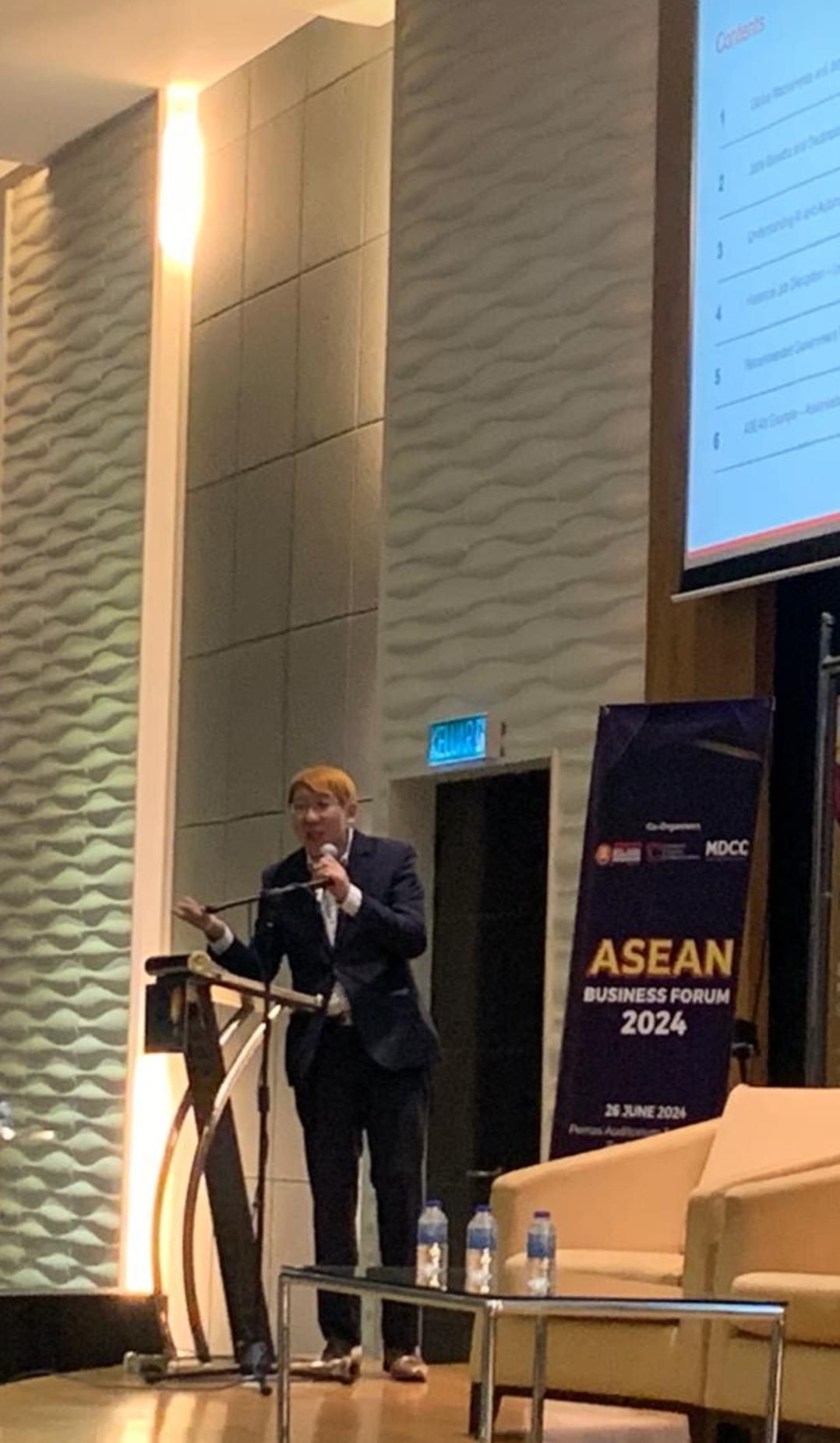
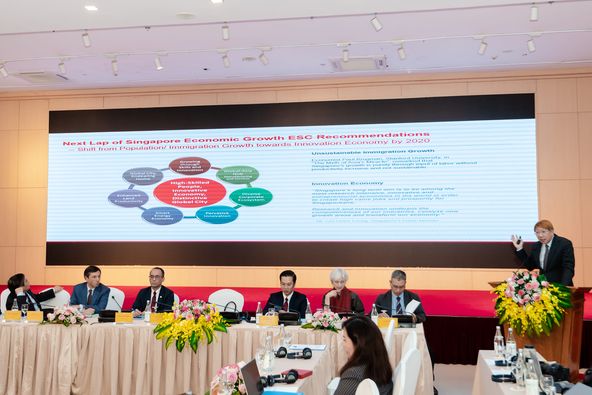
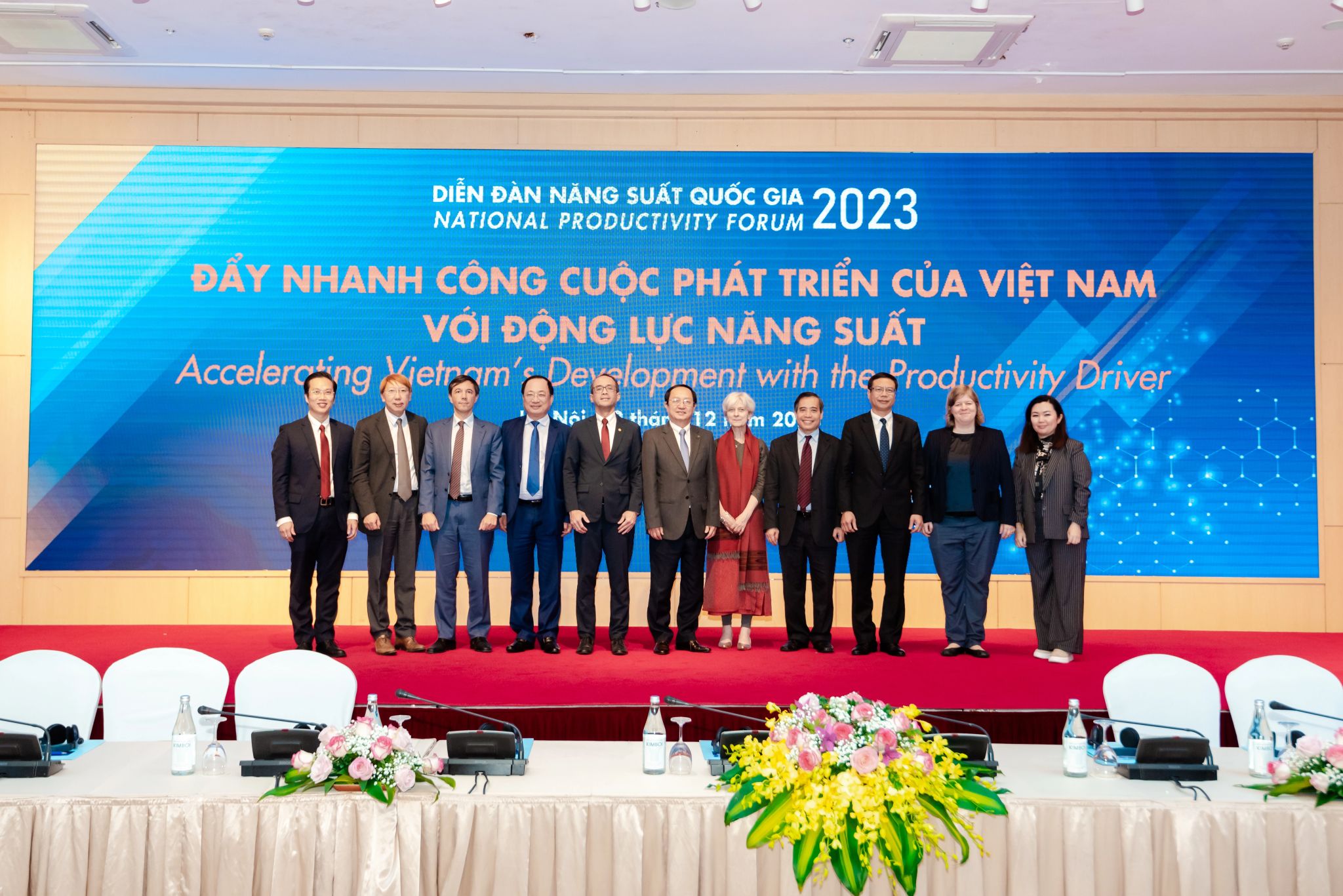
Vietnam National Productivity Conference 2023.
National Conference Hall, Hanoi, Vietnam
December 2023
Asia Productivity Organization (APO) has invited Singapore to share its experience especially from productivity journey towards its current economic development status. Global Catalyst Advisory CEO, Victor Tay, was invited to represent Singapore in the sharing on Good Policy Practice and Singapore Productivity experiences at the Vietnam National Productivity Forum organized by Ministry of Science and Technology, The National Commission for Standards, Metrology and Quality (STAMEQ) with support from Asian Productivity Organization.
Great exchanges and audienceship on opportunities for #innovation, #productivity and #economicgrowth with The World Bank, HE Huynh Thanh Dat (Minister of Science and Technologies), HE Nguyen Van Thank (Vice Chairman of Central Theoretical Council), (Chairman of Ho Chi Minh City People's Committee) and Secretary Gen Dr Indra Pradana (Asian Productivity Organization, Tokyo Japan).
COP28: "Carbon Credits as Financial Instruments" and "ESG impact on International SMEs"
Dubai Expo City, United Arab Emirates
Dec 2023
The 28th United Nations Climate Change Conference of the Parties (#COP28) will be hosted at Dubai Expo City.
COP28 focuses on key pillars, including the implementation of #climate commitments and pledges, inclusion, working together to take action and identifying solutions that contribute to overcoming challenges, and seizing opportunities to ensure a sustainable future for present and future generations.
Global Catalyst Advisory is privileged have our CEO, Victor Tay, speaking at the Green Zone of COP28 session, under IEEE auspice on #Carboncredits as #FinancialInstruments, as well as, #ESG and International #startups issues.
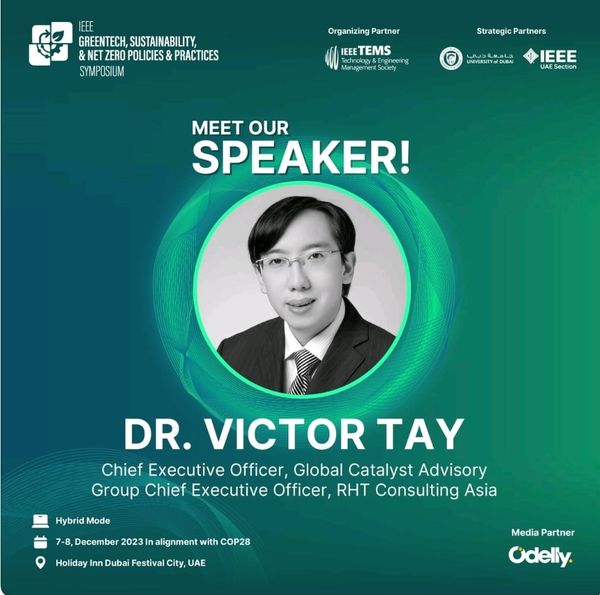
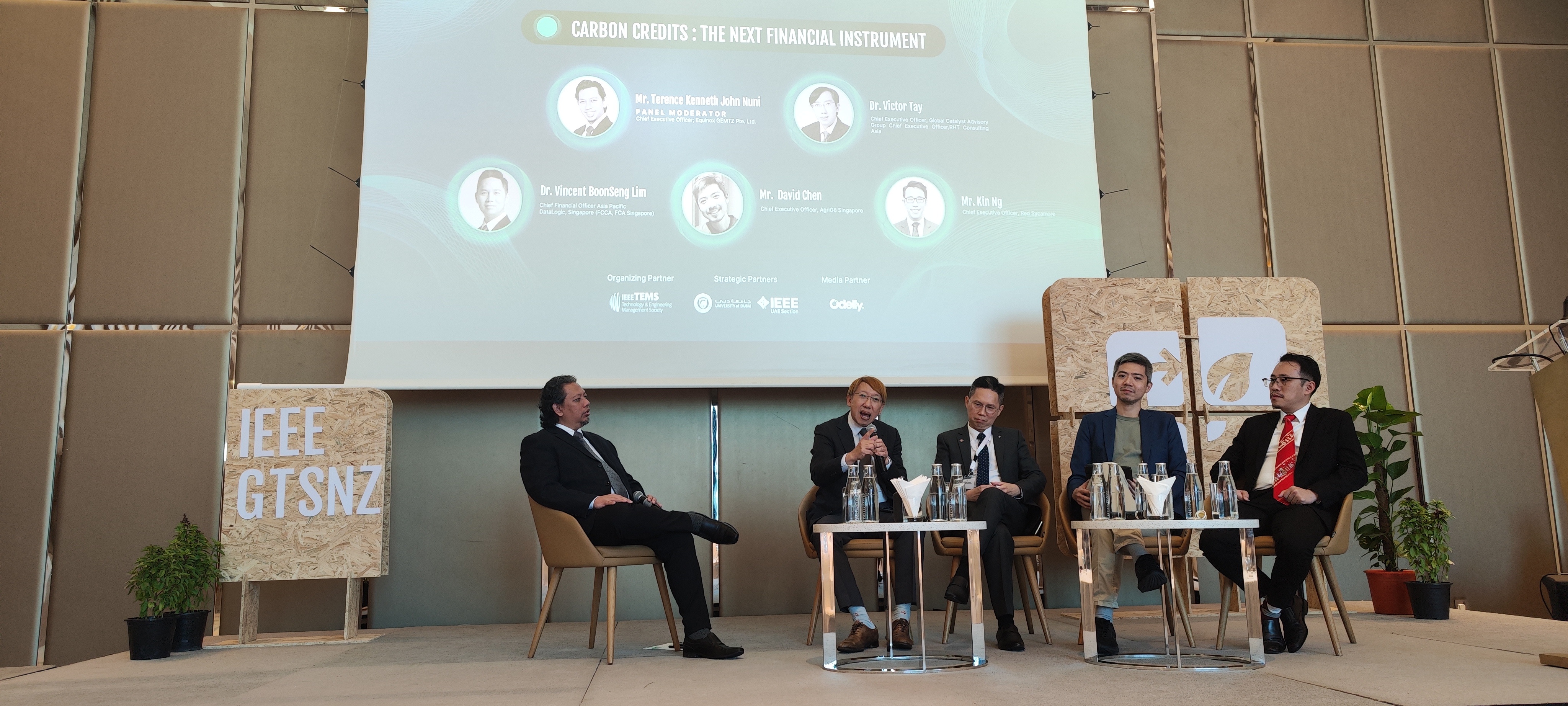
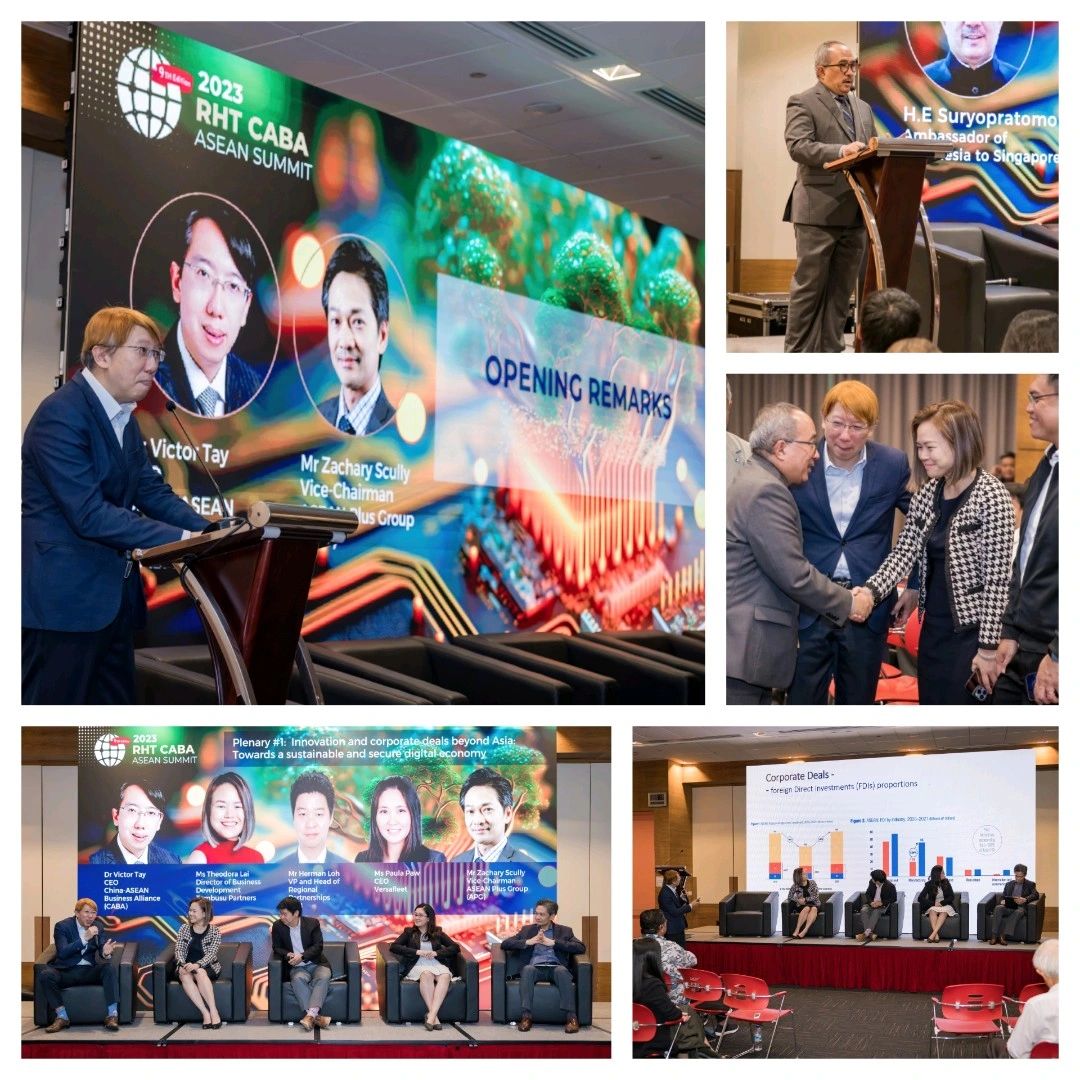
China-ASEAN Business Forum 2023.
Lifelong Learning Institute, Singapore
October 2023
Hosted the annual ASEAN Summit under the CABA (China-ASEAN Business Alliance) as a platform to discuss significant socio-political and business issues. In its 9th edition, the Summit focuses its theme on “ASEAN 2030: Towards a Sustainable and Secure Digital Economy”.
Global Catalyst Advisory CEO, Victor Tay, is privileged to chair the forum with HE Suryopratomo, Indonesian Ambassador to Singapore, giving the keynote speech on Indonesian economic progress.
1. ASEAN pacing into a promising Adulthood
Pacing into 2023, hashtag#ASEAN turned heads at the economic arena. In terms of ASEAN’s sheer growth, size, and trading power, the 10-member union is increasingly turning heads. ASEAN’s burgeoning population will have reached 705 million, making it the third-most populous market globally, with a surge to $5.65 trillion in GDP.
Equally as striking are the trading bloc’s favourable demographics. Currently, 60% of ASEAN’s population are under the age of 34 of which Vietnam and Philippines at average societal age of 23 and 25 years old respectively. By 2030, more than 350 million residents will become middle-class. If hashtag#EU is known as a matured dame in its 50s with a glorious past, ASEAN can be perceived as the energetic youth about to turn adulthood filled with promising future.
2. Socio-economic and Sustainability issues
Sheer size and buying power only tell part of the story. To truly realise this bold ambition, ingenious solutions are essential for ASEAN's most pressing socioeconomic and environmental issues. Especially amidst US-China trade war and increasing protectionism, careful navigation of evolving geopolitical shifts will be required.
Addressing ASEAN’s carbon burden will not only help mitigate these critical risks, but offers a pathway to unlock a significant socioeconomic opportunity. Driving towards a hashtag#carbon-neutral future could unleash around US$5.3 tr GDP by 2050, attracting a substantial US$3.7 to US$6.7 tr green investment and unlocking between 49 and 66m additional jobs for the ASEAN region.
hashtag#Sustainability being an important topics, we have two panels discussing this ESG issues. 2nd Key note from Asia Scotland Institute and Plenary 3 exploring the “Social” issue of ESG, while Plenary 4 focuses deeper on Sustainability opportunities in hashtag#Vietnam.
3. Digital ASEAN
On hashtag#Digitaleconomy, ASEAN is the fastest growing Internet market with 125k new users coming onto the Internet every day, the ASEAN digital economy is projected to grow significantly, adding $1 trillion to regional GDP over the next ten years.
Interview: "Profit with a Purpose - Investment Innovation with Victor Tay"
Bluente, Singapore
Nov 2023
Global Catalyst Advisory CEO, Victor Tay, is a mentor with Singapore Leaders Network (SGLN) which this year focuses on how to motivate young Singaporeans to venture overseas and embark on an international career. In tandem with the focus, he had also launched mentorship programmes in 2023 at Australian Alumni Singapore and Curtin University Alumni.
Daphne Tay, Founder of Bluente, suggested a "Business Without Border" conversation to spur younger mentees on what prompted my early career to work in Greater China, Taiwan, Vietnam, Cambodia, Bangladesh in late 90s. At early years, my secondment was given hardship allowances during my strategy consultancy days.
The conversation extends across how various international cities (e.g. favelas at Sao Paolo) addresses societal challenges with hashtag#socialenterprises and hashtag#entrepreneurship empowerment. And eventually on how the current capital world and existing business model prioritizing on financial yield will continue to be disrupted and is inadequate to address social problems.
Youtube = https://www.youtube.com/watch?v=dqY64eHItes
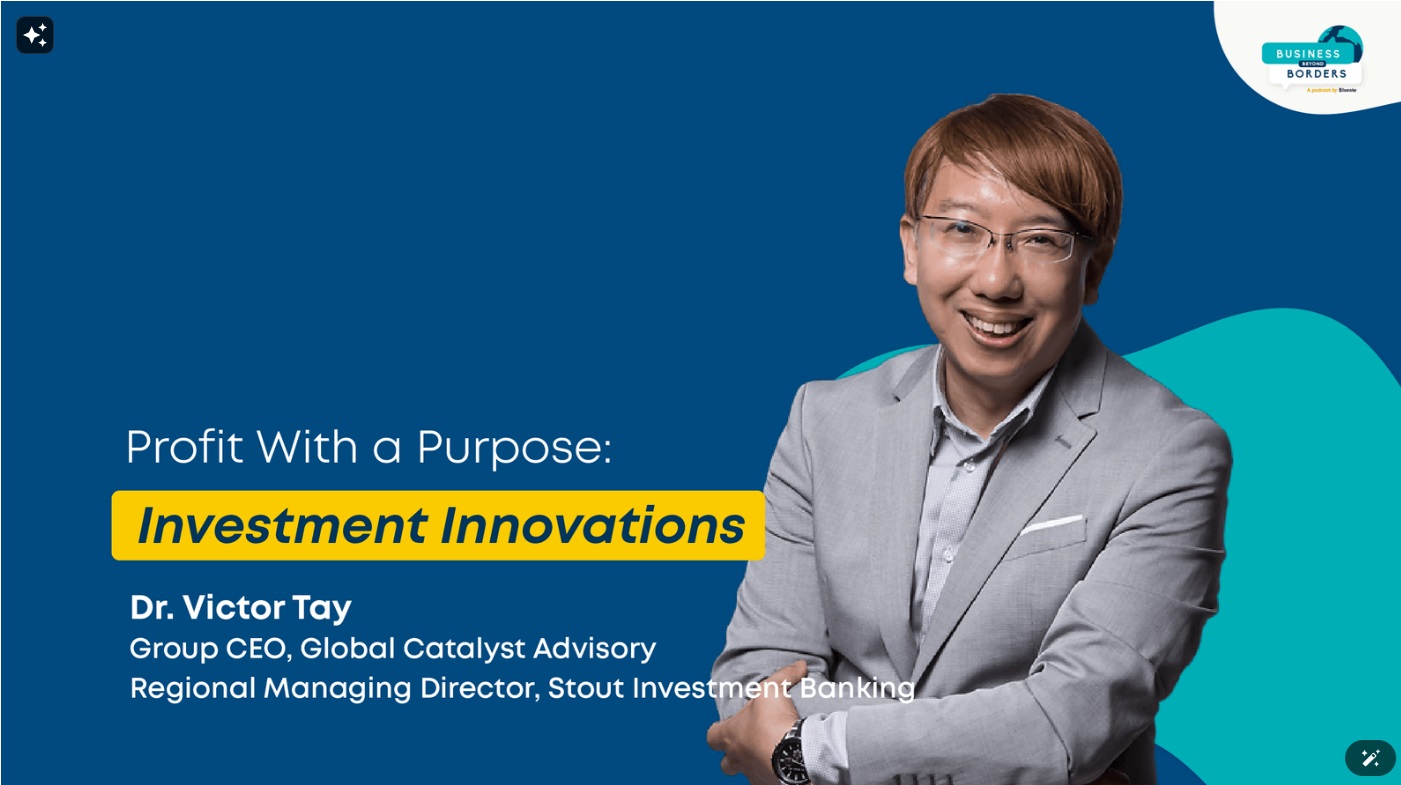

Addressing University of Oxford, Executive MBA Students.
Divinity School, University of Oxford
2nd May 2022
Global Catalyst Advisory CEO, Victor Tay, is deeply honoured to address and most humbled to receive a standing ovation from the Executive #MBA students at the 600 years old Divinity School, University of Oxford.
The Divinity School is the oldest purpose-built school for discussion on Theology decorated with spectacular architecture and breathtaking design.
Youtube = https://www.youtube.com/watch?v=gDXXMugJ1fU
Chairing Policy Discussion: "Using Regulatory Sandboxes for an Innovation-led Economy"
National University of Singapore, Lee Kuan Yew School of Public Policies
29 Nov 2021
Chairing the Policy Discussion Workshop: "Can Regulatory #Sandbox be used in an Innovation-led #Economy?"
1. Pioneering Drone Taxis
A start-up aspired to pioneer flying drones to ferry passengers but was deterred by local regulations on possible terrorism and hazard. Consequently to testbed in another continent at Nevada. Regulations at times run ahead of innovation and deter testbedding initiatives.
2. Sandboxes and Pioneers
Sandboxes were used at fintech industry which Central Banks monitor new startups, products and services without impeding innovative business model. Monetary Authority of Singapore (MAS) has established Fintech Sandboxes in 2014 which subsequently catapulted Singapore as one of the Fintech pioneering cities since 2016 versus London, New York.
3. Regulatory Vs Innovation Issues
"Can regulatory sandboxes be cascaded to more industries like sustainability, infocomm, environmental and medtech industries?"
Global Catalyst CEO had the privilege to Chair the session https://lnkd.in/g5rf4ExR at Institute of Public Policy Studies


Interview with 958FM - "Regulations on Employment and Compulsory Covid Vaccination"
Mediacorp 958FM
27th Aug 2021
Amongst the spectrum of member states of ASEAN and China, there has been various vaccines diplomacy, policies, incentives and implementation rates.
Progressing further, guidelines was released in Singapore on differentiated treatments of Employees based on vaccination status by Singapore National Employer Federation. https://www.facebook.com/capital958/?__tn__=k-R
Is this a necessary measures as employees have freedom to vaccinate and employers have flexibility to deploy staff based on vaccination.
While there is a need to balance public safety, but some employee could not vaccinate owing to medical challenges.
Will differentiated staff treatment by vaccination leads to:
- prejudiced staff treatment
- removal of staff from frontline interfacing
- unequal employment opportunities?
What are your thoughts?
Chairing Policy discussion: "Post-Covid - Critical Success Factors in the new innovation-led Economy"
Lee Kuan School of Policy Studies, National University of Singapore
24th April 2021
Taking stock on what lies ahead for 2021-2025, discussion with Dr Faizal, Israeli Dr Ori, Prof Neo Kok Beng, Prof Toh Mun Heng, industry practitioner Alan Chua, Si Ngah, Eugene Koh ( Association of Small & Medium Enterprises - ASME ) deep diving into:
1. The difference in Israeli and Singapore innovation culture
2. Our transition in innovation from previous Creative Technologies syndrome - successful overseas before Singapore's recognition to the accelerated outcome of laboratory-grown impossible meat
3. Have regulations evolved fast enough to accommodate post-Covid innovation and exigency?
4. Case studies of Artificial Wearable Kidney (FDA Vs HSA) Drones Taxi (CAAS regulations) which had to be testbedded in US prior Singapore's approval. Whereas MAS push out fintech in accelerated manner within liberalized sandbox.
5. What makes the difference in treatment between trransport (disallowing drones taxi testbed) versus finance (fintech adoption within sandbox)?
6. Can a statutory board serves 2 objectives of regulatory and promotional functions (e.g. SFA, MPA, MAS). Which takes priority and precedence?
Any thought and suggestion that you might have on Singapore's state of innovation?
Post-Covid period, the ability to evolve innovation and adjust regulations in parallel speed is essential to survive in this new reconstructed Economy.


Chairing Policy Discussion: "Rise of the Digital Economy and Business Transformation"
Lee Kuan School of Policy Studies, National University of Singapore
7th Aug 2021
Analysing Singapore current state of digitisation issues at NUS Lee Kuan Yew ScRecollecting the 1965 steely courage and unwaivering determination in the face of a reluctant Singapore's independence and unknown future.hool of Public Policies. Singapore remains the most connected country in the world, ranked 1st and 2nd for goods and financial connectivity, but 6th for data and 12th for people. Whilst businesses still found wanting for improvement in Digitalisation with SMEs alluding Covid for delay (ASME report, 2020).
Channelnewsasia TV Interview on Singapore Hong Kong Travel Bubble
Dec 2020
Commenting at News analysis on how the SIngapore Hong Kong travel bubble is important to Investment Banking and Financial hub of both economies.
Interview with 958FM - "Singapore Budget 2020 Analysis and Commentary"
Mediacorp 958FM Radio Station
18th February 2020
Fortitude - an unprecedented 4th Singapore budget amounting to $100b to battle an equivalently unparalleled crisis Covid 19, to save and propel economy, businesses and citizens.
The $33b Fortitude budget focuses on:
- Easing Cost, Cashflow, Credit and
- Digital Transformation.
Differentiating Singapore from the rest of the world has been the breath and depth of coverage. The budget not only relieves, extend cashflow lifeline for companies, but also aim at accelerating technology adoption.
Post Covid situation will see a new world order, new business norm, more telecommute, less commercial space demand, more virtual meetings, more online shopping and learnings. Those who sustain this crisis will be competitive.
This budgets features a broader and more granular coverage
I. Rental
- extension of rental waiver to 5 months (hawker)
- rebates to 2 months (commercial) and 1 month (industrial)
2. Wages
- 25-75% of JSS job supplements
- more granular coverage of sectors (Aerospace, MRO, marine, O&G, tourism etc)
3. Startups
- lending to fintech startups
- sponsoring interns to create jobs
4. Digital transformation
$5k E-payment situations for smallhold retailers and Hawkers.
Fortitide, an economic fort, to defend against Covid crisis, salvage businesses, jobs and people.
Representing Singapore at the World Franchise Council
October 2019, World Franchise Council, Abu Dhabi
Representing Singapore at World Franchise Council and Asia Pacific Franchise Council at Abu Dhabi pitching to harmonise an international standard of Franchise Conference Framework as:
- quality mark,
- diagnostic kits
- capability building tools
to help worldwide SMEs to internationalise. The Franchise competence framework can also be used as a mediation framework for franchise disputes.
Also signed a MOU between Abu Dhabi Chamber Of Commerce, UAE-Singapore Business Council, witness by Undersecretary of Ministry of Economics HE Rashid al Qaibooshi and Ambassador HE Samuel Tan, to tie both strategic gateways to Asia and Middle East for more trade, investments and business exchanges.
Franchise Competency Framework
July 2019, Launching Franchise Competence Framework, Singapore
Had conceived and developed the regional first Franchise Competency Framework. The objective of the Franchise Competency Framework is to grow enterprises and revenue through franchises. There are many advantages to growing a business through franchise. One of them being capital which is often a common barrier to expansion faced by businesses.
Interview with 89.3FM - Franchise Competence Framework and Awards
13th June 2019, Money FM - 89.3FM
Franchise typically contributes some 6-15% of a developed economy GDP (e.g. US, France, Spain etc). Many companies have internationalize, scale and multiply leveraging on Franchise as a proven and systemized approach. It enlists the expertise of a local partner, shared risk, and reduced capital investment in entering new market. Franchising and Licensing Association (FLAS) will aspire to internationalize 100 Singapore brands in 3 years. Concurrently, Victor is developing at FLAS an inaugural national-level Franchise Competence Framework to help diagnose, build capabilities and internationalize companies.


World Franchise Council
3-6 April 2019, Madrid, Spain.
Privileged to represent Singapore to participate at the World Franchise Council with some 32 countries of participants to explore and discuss issues on a franchising regulations, code of ethics and proposed a harmonized franchising competence framework worldwide.
Future of Technologies and Business Models
1 March 2019, Singapore Chinese Chamber of Commerce and Industries
Delivering a lecture on The Future of Technologies and Business Models to about 100+ audienceship of 55% senior management, with a privilged feedback of 60% excellent 32% very good. Many of the businesses found their needs to revitalise their business models if not technologies platform.


Strategy - Vision, Mission & Values in light of IR 4.0
6-7 October 2018, Malaysia
Delivering a strategic planning workshop with Malaysian top 5 real-estate developer. Exploring the competitive landscape of Proptech, RealEstate Tech, Blockchain, Virtual Reality, Built-to-Order apartment. Exploring the challenges of regulations, millennial stakeholders, changing demographics and disruptive technologies. It is not all about embracing technology. It is also about understanding your organization and your role in the ecosystem & working within the confines of regulation, capacity & capability. It's about creating the best fit for the foreseeable future!
The C-Suite Boardroom Brainstorm.
28 September 2018, Singapore
To understand the impact of Industry 4.0 in every organization, one must also look at your current organizational culture and how that resonates with change. In collaboration with Denison Consulting, have hosted participants across FMCG, Financial, Education,Franchise. Engineering Services with 360degree view of the impact of digitalization through an organizational culture survey.


The Inaugural Executive Breakfast Brainstorm.
23rd April 2018, Kuala Lumpur, Malaysia
Digitalisation has affected almost every industry across the globe, from AI to Robotics, IoT, etc. we need to navigate and seek provocative new insights by getting into the real world, actively observing, networking, and experimenting to generate valuable new ideas. This breakfast brainstorm session allows senior leaders in the region to share and take away valuable insights from each other
Women Icons Awards 2018 - Asia
13 March 2018, Singapore
With women leaders in the industry, ranging from IBM CIO, FMCG CMO, President of Women Society emploring solutions to increase number of female leadership in the boardroom


Forum on Success Factors of Entrepreneurs
14 June 2017, Singapore
Moderating the panel on Critical Success Factors of start-up entrepreneurs.
International CSR Summit 2017 - Thailand
2 June 2017, Singapore
Attending international CSR Summit in Thailand, discussing on capabilities and sustainability issues within business communities and how a triple-helix model of Government, Private and Universities can seek solutions


Budget 2017 Chinese Association for Small Medium Enterprises supported by SPRiNG Singapore and Bosses Network
14 April 2017, Singapore
Part of panel with MOS Ministry of Trade and Industry/ Ministry of Manpower Teo Ser Luck, SPRING Singapore, IDA and ASME highlighting that technology and innovation is key to being a significant differentiator for Singapore enterprises.
Budget 2017 Association for Small Medium Enterprises supported by SPRiNG Singapore and Bosses Network
14 April 2017, Singapore


Entrepreneurs' Digest Post Budget Convention
5 April 2017, Singapore
At the panel moderating a discussion with Senior Minister of State Sim Ann, SPRING Singapore, MOF, IDA on how Singapore entrepreneurs can interntionalise and leverage on consortium formation to access new international markets.
Women Icons Summit & Awards 2017
17 March 2017, Singapore
